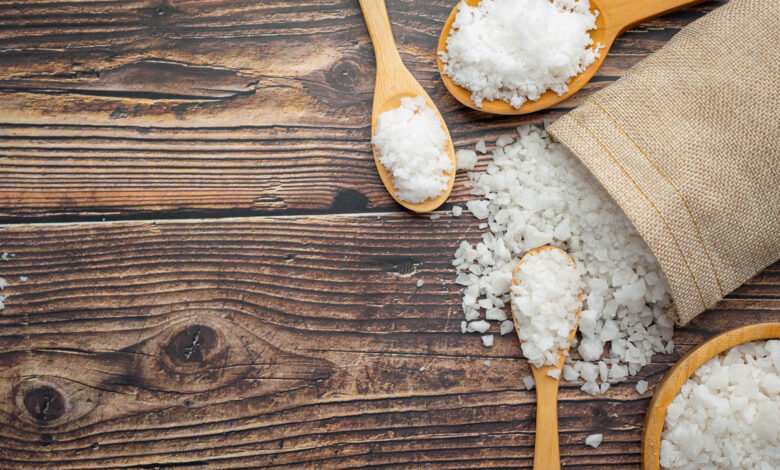Kosher Salt Vs. Sea Salt – Uses, Benefits & Key Differences

Kosher salt and sea salt are two of the most popular cooking salts. While they may appear to be similar there are significant differences in their uses, benefits, and key characteristics.
Kosher salt is widely used for pickling and preserving food while sea salt is preferred for its mineral content and unique taste.
The size and texture of the grains in these two salts are different as well. After knowing the differences between Kosher salt vs. sea salt it will help you in choosing the best one for your cooking needs.
Whether you are making a dish that requires a delicate touch or a bold flavor knowing the key differences between kosher salt and sea salt will help you make the right choice.
What Is Sea Salt?
Sea salt is a type of salt that is produced by evaporating seawater or pond saltwater. It is different from table salt in its smaller and coarser crystals. Due to its complex flavor profile, it is frequently marketed as a premium salt.
The mineral composition of sea salt is what makes it unique. It has a bluey-gray color because it is high in minerals like magnesium, potassium, and calcium.
These minerals not only color the salt but also impart a distinct flavor profile that includes a light saltiness, a subtle sweetness, and an aroma of bitterness. To know more about sea salt visit, Ittefaq Salt – a Sea Salt Supplier.
5 Uses Of Sea Salt
Sea salt is an old-age remedy for a variety of illnesses. It has been used for centuries to promote health and wellness due to its many beneficial properties.
Let’s see what five uses sea salt is offering us;
- Bath And Beauty Products
The high mineral content of sea salt makes it a popular ingredient in bath salts and beauty products. It exfoliates the skin as well as relieves muscle pain and promotes skin health in general.
- Cooking And Baking
The distinct flavor of sea salt is widely recognized and due to its mineral composition, it enhances the flavor of food when baked or cooked. It improves the variety and depth of flavor in cooking and baking.
- Health Benefits
The nutritional value and health benefits of sea salt are highly appreciated. Its mineral content aids in fluid balance regulation, bone health support, and cardiovascular wellness. However, because of the sodium content, it should be consumed in moderation.
- Preservation
Sea salt has long been used to naturally preserve meals like meats and fish. Its ability to absorb moisture helps in the preservation of these foods.
- Natural Cleaning
Sea salt is used for its cleaning qualities because of its abrasive nature and ability to remove dirt and stains from surfaces it is often found in natural cleaning solutions.
What Is Kosher Salt?
Kosher salt is a coarse-grained salt that is primarily used in culinary uses. Its name comes from its historical role in kosher meat preparation where it helped in the removal of blood from the surface of meat.
This salt is made by evaporating salt brine and has larger flakier crystals that dissolve easily. Notably, its light and airy texture allows for easy sprinkling and measuring making it a popular choice for cooking and baking. Its feathery texture prevents clumping and ensures even distribution when sprinkled over food.
5 Uses Of Kosher Salt
To make flavorful dishes you need to use kosher salt which is used in baking and cooking. Its many uses range from seasoning to curing and it can be an excellent addition to any kitchen.
So here are the five uses of kosher salt that you might did not know yet;
- Brining Meats
It’s large crystals and slow dissolution makes it ideal for brining meats, tenderizing and infusing them with flavor while maintaining moisture.
- Seasoning Vegetables
The fine texture of kosher salt allows it to season salads and vegetables equally while releasing flavor gradually for a more pronounced flavor.
- Enhancing Recipes
Kosher salt large crystals are effective in bringing out the best in various ingredients when used to intensify natural flavors.
- Finishing Salt
Sprinkled over finished dishes so that its airy quality and large crystals add a burst of flavor while elevating the overall taste and presentation.
- Cocktail Glass Rimming
Kosher salt coarse texture makes it a great option for garnishing cocktail glasses giving savory notes to margaritas.
What Is The Difference Between Kosher Salt And Sea Salt?
Kosher salt and sea salt both kitchen staples have different features that set them apart;
- Texture
Kosher salt can be identified by large, flaky crystals whereas sea salt has smaller coarser grains.
- Mineral Content
Sea salt reigns supreme in the mineral department offering a wider variety of minerals that contribute to its complex flavor and can subtly tint the salt.
- Sodium Content
While both contain sodium there are differences based on production. In general sea salt contains slightly less sodium than kosher salt but control is still necessary for a healthy diet.
- Uses
Kosher salt is excellent for brining meats, seasoning vegetables, and flavoring soups and rice. Due to its diverse mineral profile and finer grains sea salt shines in beauty products, cooking, and baking uses.
Sea Salt Vs. Kosher Salt Which One Is Better?
Since sodium is the main ingredient in salt both sea salt and kosher salt contain it. Some people believe that sea salt is better because it contains sea minerals.
However, these minerals do not offer an important nutritional boost due to their extremely small focus.
Keep in mind that neither sea salt nor kosher salt typically contains the iodine that many people require in their diet. If you require iodine use iodized table salt or get it from other foods. It is best to first consult with your doctor.
After all of this summarizing choosing between these salts comes down to personal preference. Remember that too much salt in your diet is detrimental to your health. Since every person is unique it is crucial to consider your body’s needs when choosing a salt type.
Conclusion
Kosher salt and sea salt are both excellent cooking salts with health benefits. Kosher salt is typically less expensive and has larger crystals making it an excellent choice for large-scale salting.
Sea salt has a unique flavor, is higher in minerals, and is ideal for finishing dishes. Both have their uses and advantages with the primary differences being the size of the crystals and the flavor.



